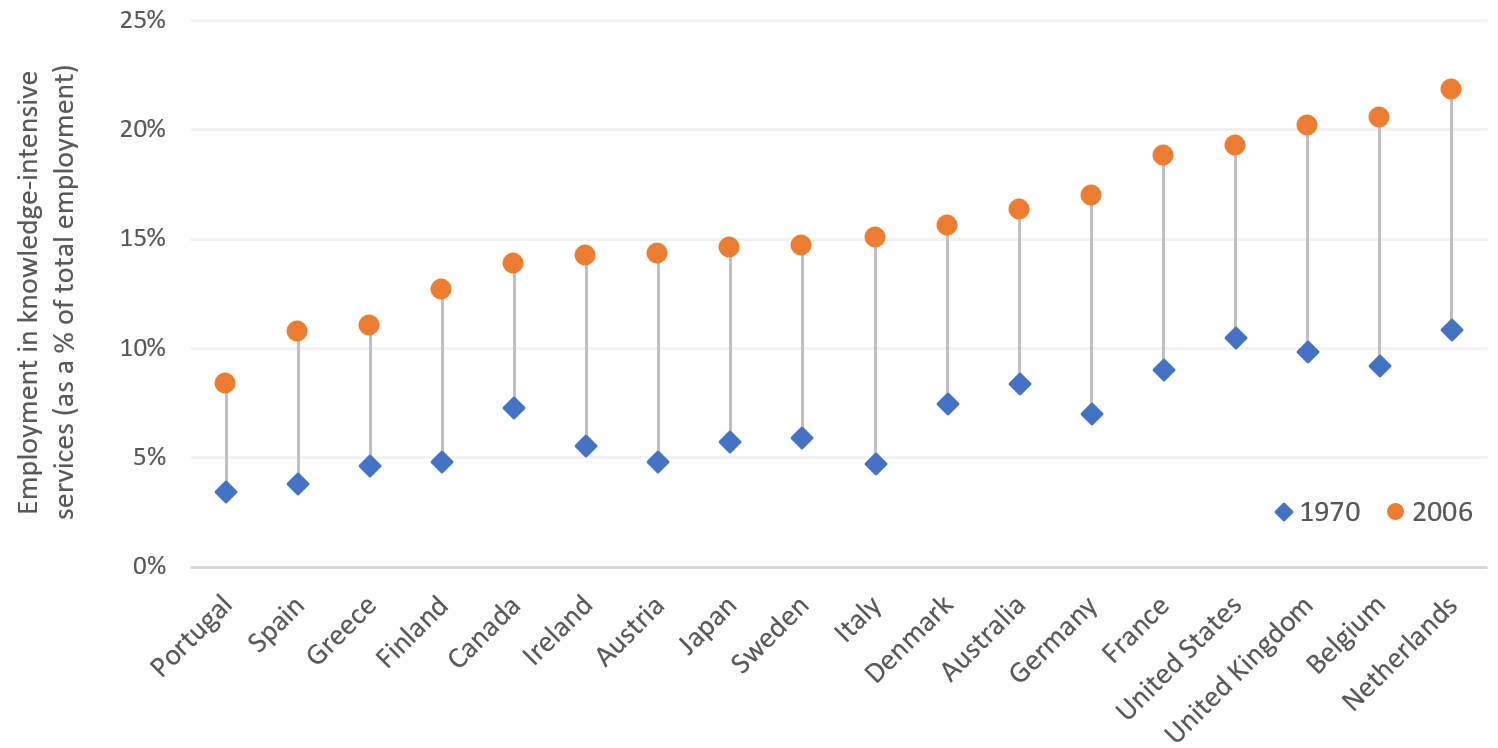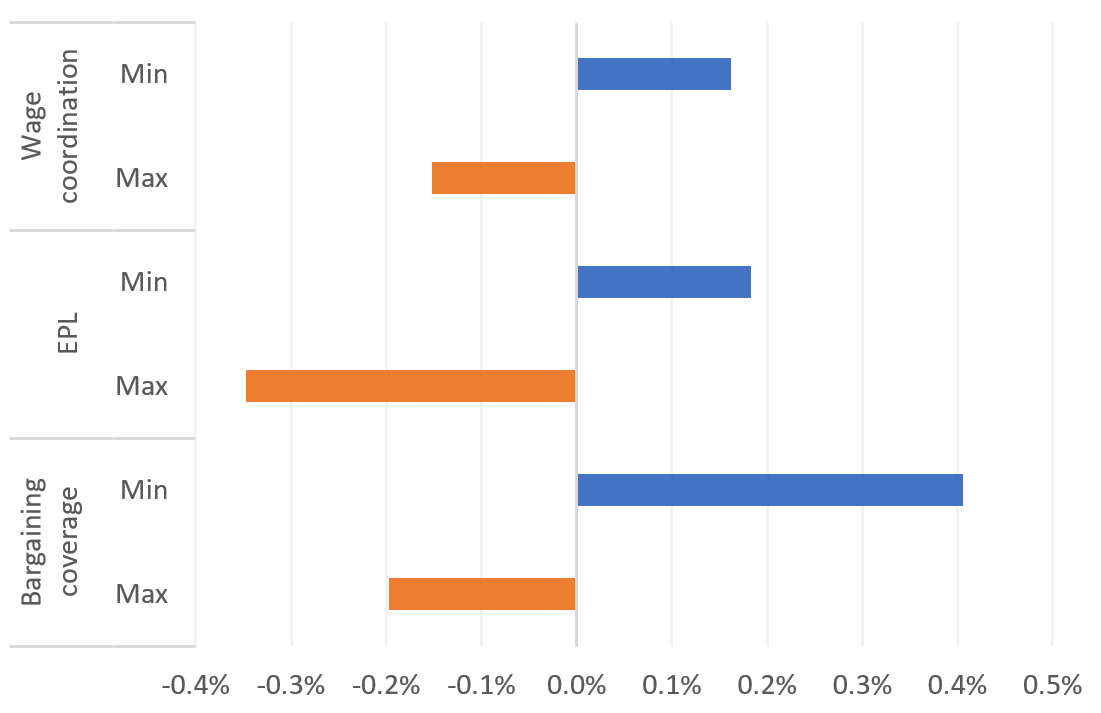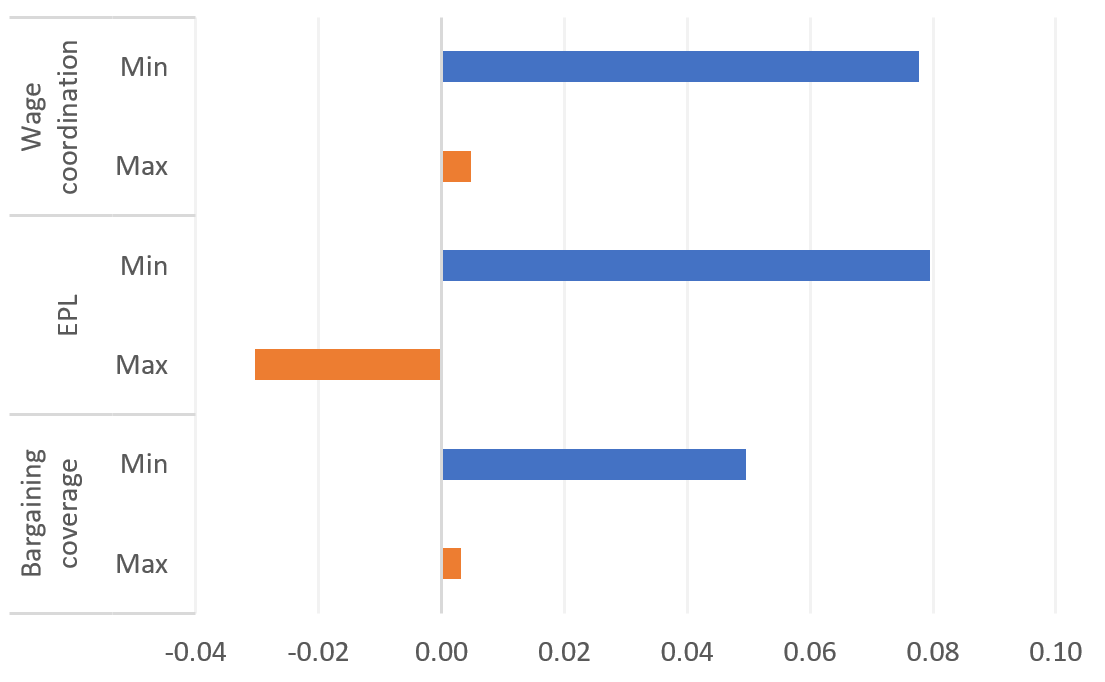
 The latter decades of the 20th century saw the rise of the so called ‘knowledge economy’ in Europe, with service sectors such as finance and telecommunications coming to dominate national economies. But these changes also occurred alongside a growth in income inequality across advanced democracies. As David Hope and Angelo Martelli highlight, many observers have assumed that the transition to the knowledge economy has weakened the ability of labour market institutions, such as coordinated wage setting and employment protection legislation, to combat inequality. However, drawing on a new study, they illustrate that labour market institutions still retain the capacity to shelter workers from structural changes in the economy, including the continued shift of workers into high-value added service sectors.
The latter decades of the 20th century saw the rise of the so called ‘knowledge economy’ in Europe, with service sectors such as finance and telecommunications coming to dominate national economies. But these changes also occurred alongside a growth in income inequality across advanced democracies. As David Hope and Angelo Martelli highlight, many observers have assumed that the transition to the knowledge economy has weakened the ability of labour market institutions, such as coordinated wage setting and employment protection legislation, to combat inequality. However, drawing on a new study, they illustrate that labour market institutions still retain the capacity to shelter workers from structural changes in the economy, including the continued shift of workers into high-value added service sectors.
The last forty years have seen a pervasive rise in income inequality across the advanced democracies of Western Europe, North America and the Asia-Pacific region. This has occurred alongside major structural change, which has seen these economies transition from Fordism – an economic system built around the mass production and consumption of standardised consumer goods, supported by collective bargaining, a generous welfare state, and Keynesian demand management policies – to the knowledge economy – where service sectors, such as finance, insurance, business services and telecommunications, dominate economic activity, and where human capital is central to economic prosperity. As shown in Figure 1, the expansion of knowledge-intensive services has been ubiquitous in the advanced democracies since 1970.
Figure 1: The expansion of employment in knowledge-intensive services in advanced democracies between 1970 and 2006
Note: Knowledge-intensive services comprise three sectors: post and telecommunications; financial intermediation; and renting of machinery and equipment and other business activities. Source: EU KLEMS Growth and Productivity Accounts: November 2009 Release, updated March 2011; O’Mahony and Timmer (2009)
The two phenomena are intimately linked. The transition to the knowledge economy has created clear winners and losers. The information and communication technology (ICT) revolution that underpinned the rise of the knowledge economy meant that complementarities in the Fordist production regime between skilled and semi-skilled workers were replaced by complementarities between skilled workers and ICT. This led to a rise in the wage premia for college-educated workers, while those workers that lost out were typically in the middle of the skill distribution with jobs that could be easily replicated by computers or machines.
The ICT revolution and globalisation have also allowed highly-talented managers, CEOs and entrepreneurs to apply their talent to a much wider pool of resources and reach a substantially larger audience than was previously possible, enhancing their ability to reap the rewards of their talents. An aspect of the knowledge economy that serves to reinforce this dynamic is the existence of large network effects, whereby the value of a product rises with its number of users (e.g. social media platforms), often leading to the creation of winner-take-all or winner-take-most markets.
However, while the transition to the knowledge economy has put upward pressure on inequality in all the advanced democracies, there are striking differences in the inequality trajectories of different economies. Using two widely-used measures of income inequality – the income share of the top 1% and the 90-10 wage ratio – it is clear that inequality has grown more rapidly in the English-speaking countries than in the continental and northern European economies. For example, the income share of the top 1% in 2006 was 14.8% in the UK and 20.1% in the US, compared to 11.2% in France, and just 6.8% in the Netherlands.
As we might expect, the UK and US saw large employment expansions in knowledge-intensive services between 1970 and 2006. However, many countries where inequality growth was much more subdued, such as France, Belgium and the Netherlands, also saw dramatic expansions in knowledge-intensive services (see Figure 1).
This leaves a clear puzzle: given the common pressures from the transition to the knowledge economy, why has income inequality not risen to the same extent across the advanced democracies? We address this gap in the literature by investigating whether the effect of the knowledge economy on inequality varies across countries with different labour market institutions. While there is a large body of empirical work that finds that labour market institutions help restrain dispersion in the distribution of income, no cross-national study has investigated whether labour market institutions can mitigate the effects of the transition to the knowledge economy on income inequality.
Although requiring further development, there is a theoretical literature that provides the motivation for focusing on this interaction. Technology adoption and the upgrading of the employment structure can be encouraged by labour market institutions that set a high wage floor. The improvements in productivity that come with these investments in low-skilled workers can boost their productivity and therefore lower overall wage dispersion. In addition, previous research* has shown that employment protection legislation insulates workers from the routinisation associated with technological change and consequently constrains the wage effects associated with job polarisation. Turning to the top end of the income distribution, as the more coordinated continental and northern European countries did not have labour market institutions or corporate governance systems conducive to firm strategies centred on short-term profits, Anthony Roberts and Roy Kwon argue that they were better able to rein in the incomes of the most affluent households during the transition to the knowledge economy.
We conduct our analysis by carrying out a panel data econometric analysis of 18 OECD countries from 1970 to 2007. The countries (as shown in Figure 1) vary markedly in their industrial relations systems, and more broadly in the organisation of their political economies. We look at four measures of labour market institutions – the coordination of wage-setting, the adjusted bargaining coverage rate, trade union density, and employment protection legislation for workers on permanent contracts; and two measures of income inequality – the 90-10 wage ratio and the income share of the top 1%. We employ Prais–Winsten regressions as our empirical strategy, as this approach helps address estimation problems that commonly arise with time series cross-sectional data.
Controlling for other variables that have been found to be drivers of income inequality – education, partisanship, financialisation, globalisation, and the state of the economy – we find that the presence of strong labour market institutions, in the form of coordinated wage setting, employment protection legislation, and high wage bargaining coverage, reduces the effect of the expansion of employment in knowledge-intensive services on income inequality. Trade union density, on the other hand, does not significantly affect the relationship between knowledge employment and income inequality.
Figures 2 and 3 show the estimated effects of a 1 percentage point increase in employment in knowledge intensive services as a percentage of total employment on the income share of the top 1% and the 90-10 wage ratio when our statistically significant labour market institutions are at the maximum and minimum values observed in the sample. We can see that for the income share of the top 1% (Figure 2), an increase in knowledge employment is associated with an increase in inequality when labour market institutions are very weak and a reduction in inequality when labour market institutions are very strong. Similar patterns emerge for the 90-10 wage ratio (Figure 3), but in this case, even the maximum values of wage coordination and bargaining coverage are not sufficient to reverse the positive association between the expansion of knowledge employment and wage inequality.
Figure 2: Estimated effect on the income share of the top 1% of a one percentage point increase in the share of knowledge employment
Source: Authors’ calculations
Figure 3: Estimated effect on the 90–10 wage ratio of a one percentage point increase in the share of knowledge employment
Source: Authors’ calculations
While our analysis is able to pin down the importance of labour market institutions for mitigating the inequality effects of the transition to the knowledge economy, a fruitful avenue for future research would be to examine the underlying mechanisms at work. For instance, micro-level empirical analyses or qualitative case studies could examine how labour market institutions have interacted with the expansion of knowledge employment to ensure greater wage solidarity in Scandinavia and some parts of continental Europe than elsewhere. The extent to which producer groups, such as unions and employers’ associations, have adapted their strategies in the knowledge economy would also be an interesting area for further investigation.
Our findings make an important contribution to emerging comparative political economy literature on the knowledge economy by challenging the dominant narrative that the complementarities between skilled and semi-skilled workers that underpinned the Fordist era have been so undermined by the ICT revolution that national industrial relations systems are no longer the main guarantors of wage solidarity across the labour force. The results of our empirical analysis show that labour market institutions retain the capacity to shelter workers from structural changes in the economy; in this case by alleviating the pressure on income inequality arising from the continued shift of workers into high-value added, ICT-intensive, service sectors.
*This refers to research by Angelo Martelli which is not yet available online
Please read our comments policy before commenting.
Note: This article draws on a recent working paper. It gives the views of the authors, not the position of EUROPP – European Politics and Policy or the London School of Economics.
_________________________________
 David Hope – King’s College London
David Hope – King’s College London
David Hope is a Lecturer in Political Economy in the Department of Political Economy at King’s College London.
–
 Angelo Martelli – LSE
Angelo Martelli – LSE
Angelo Martelli is a Postdoctoral Research Fellow in the European Institute at the London School of Economics.






